Dispelling myths behind water smoking to save our youth, especially in Lebanon “A smoking session with water pipe is like smoking two packets of cigarettes.” Lebanese-US academic Dr Najat Saliba “… we can no longer afford to maintain the gap in quality of education between public and private schools" Fadi Fawaz, advisor to the Lebanese Prime Minister” Oct 2019 (Translation appears in Arabic Section) Sydney - M E Times Int'l: Water pipe (argileh/hookah) use has snowballed globally. In Sydney its use exploded among the youth after the introduction of flavoured tobacco (moassel). This emerging epidemic has grown from false claims that water pipe smoking is a relatively safe hobby and that toxic components from water pipe smoke are not inhaled because they are trapped in water. 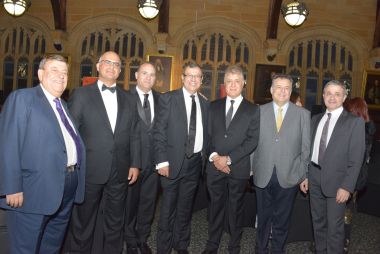
Ghossayn, Fawaz, Barakat, Macaron, Alameddine, Shelala and Nicolas
The guest speaker at the Australian Lebanese Foundation’s 2019 scholarship dinner held in Sydney, Dr Najat Saliba, is at the forefront of discovering and understanding the toxic and cancer-causing chemicals in water pipe smoking and worked very hard with the scientific community for 15 years to dispel these myths. Dr Saliba is a distinguished Professor of Analytic Chemistry and Director of the Centre for Nature Conservation at the American University of Beirut. She has received many international awards including the 2019 UNESCO International Award for Women in Science. Dr Saliba studied at the Lebanese University then moved to the United States, earning her master’s degree at California State University. She completed her doctoral studies on water pollution at the University of Southern California and was a postdoctoral researcher at the University of California. 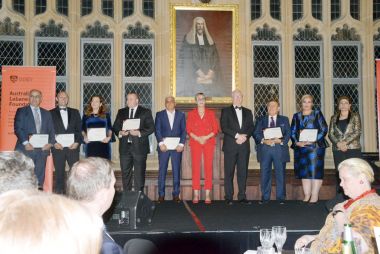
The sponsors received certificates of appreciation
FOUNDATION PRESIDENT PROF. DR FADIA GHOSSAYN I would like especially to extend a warm welcome to our guest speaker Dr Najat Saliba and our guests from Lebanon, Fadi Fawaz, advisor to the Lebanese Prime Minister, and Rudy Hachache, producer and reporter from Sarel Wa2et, who have travelled a long way to be with us. We do not celebrate our past heritage or simply nurture old relationships so that it remains in the past. No – we are here because we want our heritage to endure through the generations so that our grandchildren and great grandchildren can benefit from the best values of our culture and ancestors. It is very relevant every time we meet as a community, among many influential colleagues and friends, to ask ourselves the important question – what type of world do we want to leave behind? This is a very important question, now more than ever. This is why we are honoured to welcome Dr Najat Saliba who has spent most of her career thinking about the future. Whether it is her internationally recognised efforts to combat water and air pollution or her work raising awareness of the health impact of argileh – she is determined to leave the world a better place for future generations. It is impossible to know exactly what the future holds, but as long as we continue to nurture the flame of the Lebanese spirit and keep looking forward with people like Dr Saliba to inspire us, young talent to share their passion with us, young people to exhibit their pride of their heritage and young students to strive for learning for a better life, we have many reasons to be optimistic. 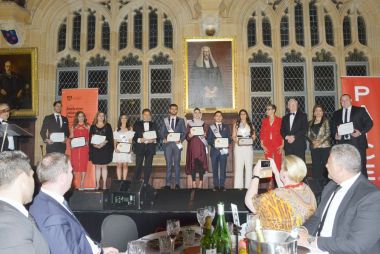
The sponsors received certificates of appreciation
FADI FAWAZ Our grand hero, the late Rafic Harriri believed in his heart in education to combat poverty and improve liberty. Thousands of Lebanese were given the chance to attend school and to study in the best universities in Lebanon and abroad, even here in Australia. He knew that building hearts and minds fidgeted by years of war will be the hardest task and one that can only be achieved through education. “… we can no longer afford to maintain the gap in quality of education between public and private schools" Fadi Fawaz, advisor to the Lebanese Prime Minister” Education is another area that the Lebanese Government is intent on tackling; we can no longer afford to maintain the gap in quality of education between public and private schools. Even the Lebanese University, the only public institution for higher learning in Lebanon, suffers from a stigma in dealing within a systematic insidious ways. It had never been about a lack of solutions or lack of funding investment or political will that keep public schools lagging behind. Higher education has unfortunately become a profitable commodity in Lebanon. It is a sad state of affairs but certainly not a reputable one. At the end I would like to thank all Australian Lebanese, Professor Dr Fadia Ghossayn and certainly Dean Sheikha and George Ghossayn, for extending the invitation to speak to you and for the excellent job they are doing at the academy. 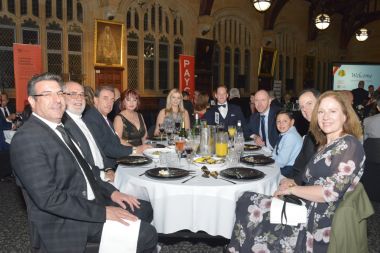
Deiri, Harb and other guests
DR NAJAT SALIBA Back home tobacco kills eight million people every year; 1.2 million die from second-hand smoking and out of these 65,000 are children. 80% of the 1.1 billion smokers live in low and middle income country, according to the World Health Organisation. The bad news is tobacco smoke kills; it’s the number one killer in the world. The good news is that it is the only environmental risk that you have control over. It is all in your hands you choose to die or you choose to live; you choose to kill people living in your home or you choose to make them really healthy. This is the only environmental risk that you don’t need a major investment to set unlike water pollution or air. It is all up to you. A smoking session with water pipe is like smoking two packets of cigarettes. In terms of formal device (another carcinogen) this is five cigarettes, In terms of carbon monoxide two packs, in terms of tar three packs and in terms of nicotine three cigarettes and in terms of particles seven packets of cigarettes -- In one water pipe session. Lebanon tops the world in youth smoking water pipe. This is very damaging because as officials they say that if people young people at the age of 13 to 15 years old are smoking this much nicotine they will become addicted for life. Plus their developing tissues are going to be damaged for life. This is an emergency that definitely requires the attention of policy makers and health officials. Overall on top of this 60% of men in Lebanon smoke water pipes and, if we standardise all ages, women top world in smoking water pipe. We definitely have an epidemic. 
Berro, Andary, C.G Macaron and Dr Matar This started to show because people are saying that in the next 30 to 40 years we are going to top the world with lung cancer and it is already starting to show. If we look at the reasons why people are dying between the ages of 15 and 49 in the world we see that cardiovascular disease is number one killer. In Lebanon it is not the case; in our case, cancer is the killer. We top the world with bladder cancer due to smoking. The next beast is vaping. Vaping means means smoking electronic cigarettes. This is not by coincidence because when you hear vaper you think water vapour; in fact it is not water vapour. The electronic cigarettes started like a cigarette then the model starting to evolve to include a lot of models a lot of models and shapes. The last one is called juul; it is an electronic cigarette that looks like a USB and it has invaded high school and youth because people can have it in their pockets and smoke it at any time. In 2011 there were 7 million vapers and users of electronic cigarettes; in 2016 the number is 35 million and it is expected to increase to 55 by 2021. The market of electronic cigarettes has risen like crazy. In 2014 the market was $7 billion. In 2019 it’s $19 billion. The spread of electronic cigarettes uptake by youth increased tremendously; from 2017 to 2019 it increased by 78%. There are 3 million high school students smoking electronic cigarettes in the US alone, double the amount of regular cigarettes. Up to date there are 15,000 different flavours that they added to the electronic cigarettes; this is what makes it very appealing to youth. So you have candy, watermelon; you have anything and everything in it. What we also found it is true in some cases that nicotine is lower than cigarettes but in some other cases electronic cigarettes have much higher nicotine. 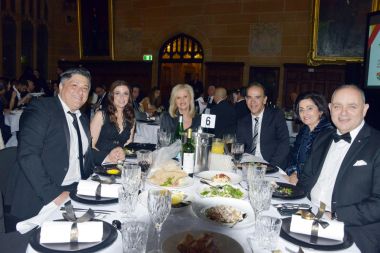
Mr&Mrs Sukkar with Arraj and other guests
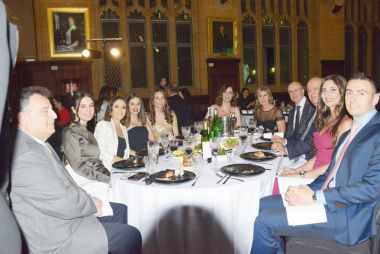
Duweihi with family members
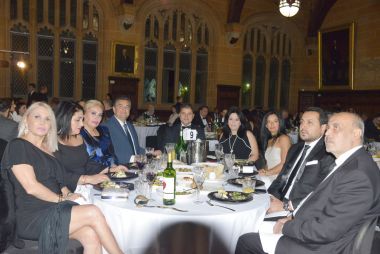
Members of Bank of Sydney, Hacham, Tadros, Al Hassan and other guests
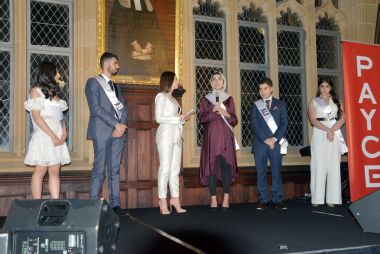
Ms Ayoub in discussion with a number of the students
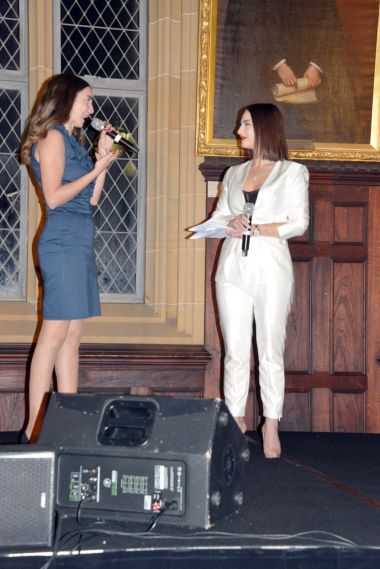
Mr Ayoub (L) in conversation with Ms Geagea
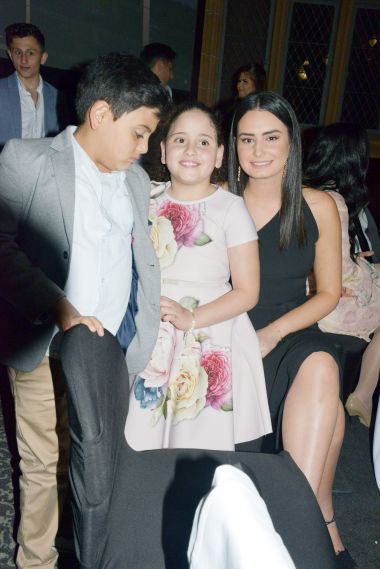
Ms Boustany with Josette & Wadih-Charbel children of George&Fadia Ghossayn
|


